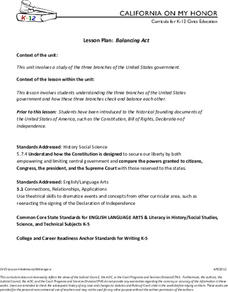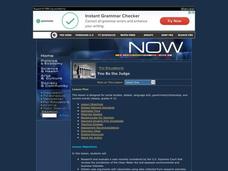Judicial Learning Center
Law and the Rule of Law
We hear a lot about the importance of the rule of law, but most people do not really know what those words mean. The lesson is a webpage that defines the rule of law, explains why it is important in a democratic society and provides...
Judicial Branch of California
Our Government Today…What A System!
A group of citizens in North Canada has decided to leave their country, and they are asking for help in setting up an American-style democracy. Using a carefully structured activity, pupils lay out the principles in the American...
Judicial Learning Center
Why Study Landmark Cases?
Why study landmark Supreme court cases? A helpful lesson offers a brief but valuable argument for the importance of these cases in the field of criminology. It introduces scholars to some key terms necessary for studying court cases and...
Curated OER
The Role of the Judiciary in a System of Separation of Powers and Checks and Balances
Learners determine the role of each branch of government in a system of checks and balances. They demonstrate the role of the judiciary in American government
Judicial Branch of California
Balancing Act: The Three Branches
What do hula hoops and the American system of government have in common? Using hands-on station activities, pupils consider the roles of the three branches of government. A script for teachers and writing prompts help round out a...
Curated OER
Moot Court Preparation
Twelfth graders prepare themselves for a mock moot court. In groups, they are presented with an overview of each activity and research appellate cases related to the topic given to them. They identify regions of the country that have...
Curated OER
Moot Court
Students research and discuss court cases in preparation for Moot Court. Student attorneys research precedents involving their cases, while student justices research political ideology of Supreme Court Justices. Student attorneys then...
Curated OER
Michigan Court System (Part 1) (Middle School)
Young scholars identify the courts that make up the Michigan judicial system. They explore the responsibility of each court and diagram how cases move to the Supreme Court. They compare and contrast the different types of courts.
State Bar of Texas
Wisconsin v. Yoder
How far does freedom of religion truly go? The 1972 Supreme Court case Wisconsin v. Yoder introduces the concept of the free exercise clause of the First Amendment. Individuals examine the case with a short video and open discussion. To...
K12 Reader
What is a Tribal Government?
What is life like on a Native American reservation? Learn about the ways a tribal government works with a reading comprehension activity. After reading a short passage, kids use context clues to answer five comprehension questions.
Judicial Learning Center
The Ratification Debate
Most Americans profess their love for the US Constitution, but this was not always the case. An informative lesson overviews the debate between the Federalists and Anti-Federalists by summarizing the main arguments of each side. It...
Curated OER
Civil Rights and the Michigan Supreme Court II
Students view a PowerPoint presentation on the Michigan Supreme Court Historical Society's Civil Rights and/or the Native American Rights. They write a reaction paper and prepare for a class discussion. They work in groups and discuss...
Curated OER
Sundials: Keeping Time Like Native Americans
Students explore the use of sundials. They observe the shadows cast by the sun and record the times at various points throughout the day. They create sundials and record the location of the shadows and the time of day. They view a...
Curated OER
Civil Liberties and War Powers: Korematsu v. United States
Eleventh graders compare and contrast Supreme Court decisions dealing with the application of civil rights during times of war, with emphasis on discrimination and detention. Working in groups, 11th graders review cases and analyze how...
Curated OER
Stories of Freedom and Justice: Learning Resources
Students are introduce to the topic of nonviolence and civil rights by watching a video. In this stories of freedom lesson plan, students examine the Supreme Court's role in interpreting the U.S. Constitution. Students analyze how...
Curated OER
Eighteenth-Century Slave Codes
Students explore slavery by reviewing the written laws intended to keep African Americans subservient. In this U.S. slavery lesson, students analyze a time-line of the history of African Americans. Students discuss the patterns of the...
Constitutional Rights Foundation
Elections, Money, and the First Amendment
Those who spend the most, win. Academics read informational text, participate in group discussion, and defend campaign reforms to understand the correlation between money, the First Amendment, and election results. The resource explains...
Teaching Tolerance
The War on Drugs—Mechanisms and Effects
The war on drugs doesn't have definite results. An interesting lesson examines the social, political, and economic effect of the war on drugs. Academics learn how the war on drugs has led to mass incarcerations and negatively affected...
DocsTeach
U.S. v. Amistad: A Case of Jurisdiction
Just what is jurisdiction and why does it matter? A helpful activity takes academics on a journey to understand how judicial jurisdiction works. Scholars read excerpts from the Constitution and court documents to understand the process...
Constitutional Rights Foundation
The Role of the Judiciary
The role of the judicial branch has far reaches into American life. Learners consider its uses with a reading on the branch and a structured conversation on the topic. Together, they work to root their contributions to the discussion in...
Curated OER
Mediation/Conciliation
Twelfth graders discuss the court system in Japan, and assume roles of family members and friends of air crash victims. They discuss whether they would file suit against airlines, compare methods of achieving justice in United States and...
Curated OER
The Supremes
Students discuss steps cases go through to reach Supreme Court, examine Bill of Rights, and rank rights in order of importance to them. Students then research Supreme Court case dealing with one of first ten amendments, and write about...
Curated OER
With Liberty and Justice for All
Students examine the role of Supreme Court justices. In this judicial branch lesson, students consider the civil rights and civil liberties as they investigate Minersville School District v. Gobitis (1940) and West Virginia State Board...
Curated OER
You Be the Judge
Young scholars research and evaluate a case considered by the U.S. Supreme Court regarding the jurisdiction of the Clean Water Act. They watch a Bill Moyers video, conduct a debate, and write about the decision they would make if they...

























